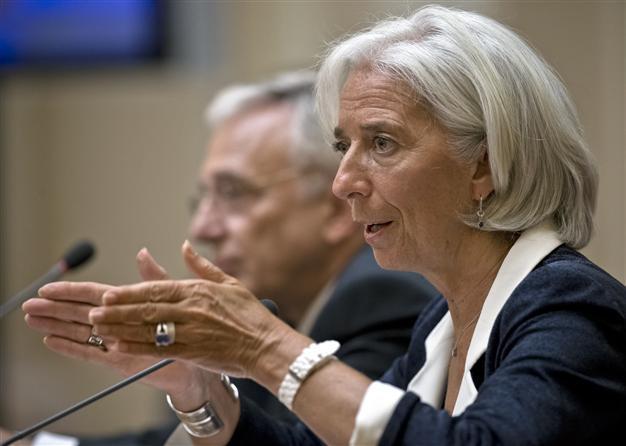IMF says Eastern Europe probably past the worst of crisis
BUCHAREST - Agence France-Presse

International Monetary Fund (IMF) Managing Director Christine Lagarde, right, answers questions from the audience next to Romanian national bank governor Mugur Isarescu, left, after her speech at the National Bank of Romania, in Bucharest, Romania, Tuesday, July 16, 2013. AP photo
International Monetary Fund chief Christine Lagarde on Tuesday praised Eastern Europe for its "courage" in addressing economic crises since 2008, stressing that "the worst is most likely behind" it.
"Five years after the start of the crisis the worst is most likely behind you, most countries have returned to positive growth," Lagarde told Romanian bankers and journalists.
"We expect only two countries of the region to be in recession in 2013 - Croatia and Slovenia - compared to eight last year," she added during a speech on "Eastern Europe and Romania: The Road Ahead." First-quarter average growth in the region was positive. The top performers were Latvia, growing 1.4 percent and Lithuania 1.3 percent.
Meanwhile the economy of the entire European Union shrank by 0.1 percent. Earlier this month, the IMF cut its global economic growth forecast, citing new downside risks in key emerging-market economies and a deeper recession in the eurozone.
The IMF projected that the global economy would grow 3.1 percent in 2013, down from its April estimate of 3.3 percent.
Lagarde urged Eastern European countries to continue macroeconomic stability, fairly share the burden of adjustment and spur growth to fully capitalise on progress made since the collapse of communism.
"What has happened in this part of the world is setting standards about what can be done in other parts of the world" in terms of transition to a market economy, she said.
The IMF head stressed that rigid labour markets, inefficient administration or unfinished transition processes, including the restitution of property, were "roadblocks".
They had to be removed if the region were to "break down the barriers to more dynamic growth." Referring to Romania, she praised the "massive fiscal consolidation and the key structural reforms" conducted in partnership with the IMF.
In 2009 when it was in the grips of severe recession, Romania concluded a 20-billion-euro ($26-billion) bailout deal with the IMF and the EU, in exchange for strict austerity measures. In March 2011 it signed a new 5.0-billion-euro stand-by agreement, which the IMF said last month had been concluded successfully.
Romania and the IMF will start talks on a new deal on Wednesday, which authorities say will boost investor confidence and help the Balkan country obtain low-interest credits.
